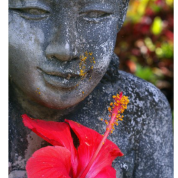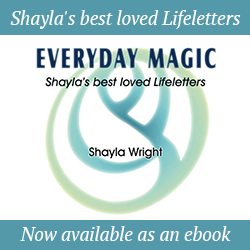
Teachings are great–without our teachers and what they offer us, we would be pretty stuck. Teachers can take an infinite variety of forms; sometimes a heartbreak or a crisis is a more powerful teacher than a human being who sits on a special seat at the front of the room. Many people have been transformed in the presence of animals and trees and children.
The trouble with the more formal teachings is that they can very easily just live in our minds, not in our guts, our bones, and our hearts. When we conceptualize them, we give the real living truth of our life and our experience away. We sacrifice what is real on the altar of what we have been told, what we have heard or read from someone who seems to be wiser than we are.
We pay a high price whenever we do this. The flow of our natural awakening and development shuts down. I’ve noticed this a lot with people who follow spiritual teaching about desire and aggression. There is nothing wrong with desire, nothing wrong with anger and aggression. These are sacred energies, an expression of our own life force, and there is powerful intelligence living inside them. Of course, there are distorted forms of desire and aggression and healthy forms. Our work as a human being is to learn the difference between them.
Unfortunately, many spiritual teachers, writers, and philosophers have simply condemned desire, passion, and aggression. Instead of teaching people to open to the intelligence hidden within them, passion and aggression are held as problems, as obstacles, we must overcome if we want to grow and awaken. On this kind of path, we are offered a vision of a life where we never get angry again, where we have transcended longing and desire.These images are fantasies that are actually very destructive. They shut down the natural integrity of our evolution, of our capacity to be more and more fully and freely ourselves. It’s not easy to hold a grounded space for the energy of anger or deep longing. These feelings can be intense, and very uncomfortable. And our cultural and spiritual conditioning often imprints a feeling of shame that arises with these feelings and is often entangled with them. It’s so much easier to transcend, to lift up and away into the greater field of presence, light, and consciousness.
We can consider desire and anger as expressions of ‘yes’ and ‘no’. The intelligence that lives in deep longing and desire, that is contained in our authentic ‘yes’ is the longing to explore, to connect, to expand, to take risks, to participate fully in life.
The intelligence contained in our authentic ‘no’ is the power to stand up for ourselves, to discriminate and discern, to hold clear boundaries, and to protect ourselves and others. Our no can be a powerful expression of truth: “I’ve had enough-something needs to change here. I am simply no longer willing to tolerate this. ” Who told us that it was a good idea to walk through life without a strong and very clear no? Not a reactive no, but an embodied no, based on our own inner clarity.
If we are not able to access these energies, the flow of our life gets blocked. If I am not clear about what I am saying ‘no’ to in my life and what I am saying ‘yes’ to, a kind of resignation or paralysis can set in. I might have a spiritual idea that accepting everything is the way to be. But that acceptance is conceptual, and it’s smothering the vitality of my real yes and no.
“Our capacity to express the basic power of yes and no often becomes damaged in childhood. And this incapacity becomes installed in our psyche as a tendency to oscillate between compliance and defiance.” (John Welwood, ‘Toward a Psychology of Awakening‘)
To truly grow up means I no longer compromise with my authentic yes and no. I don’t become rigid either. I simply allow my yes and no to be expressed, to be heard, to be honoured. This opens a movement, a field of consciousness, that re-organizes my whole way of being in the world.
Yes and No are beautiful. They are the sacred language of the soul, of the heart.
All the true vows
are secret vows
the ones we speak out loud
are the ones we break.
There is only one life
you can call your own
and a thousand others
you can call by any name you want.
Hold to the truth you make
every day with your own body,
don’t turn your face away.
Hold to your own truth
at the center of the image
you were born with.
Those who do not understand
their destiny will never understand
the friends they have made
nor the work they have chosen
nor the one life that waits
beyond all the others.
~David Whyte, ‘All the True Vows’
with love,
Shayla


Thanks for this Shayla …
The fall from non grace was painful
wrist and elbow accepting the energy
so great they couldn’t contain
I lay face down on the sidewalk
alone
as birds sang
the dust sweet in my nostrils
Yes one often forgets the teacher is there as a guide to help us reach into our true selves. As students we have the job of integrating teachings into our own lives, not try and live the life of the teacher.
Thanks for the reminder that a NO is ok and just as valid as a YES.
Love it Shayla! So fulfilling to read you writing about this! Such an important thing to write about.
Reminds of the main concept from a very interesting book If you meet the Buddha on the Road Kill Him. Title is a bit extreme to try to make a point. Also reminded me of a slightly different angle. A dear friend, Lars Chose used to always ask when we say no, what are we saying yes to? So empowering, so important to come from the ground up, the inside out.
My inner advocate is standing up and cheering.
xox
Jude